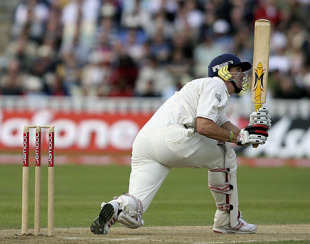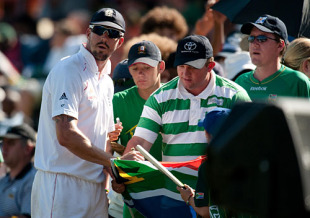| 
| KP: often turned spectators into pogo sticks © Getty Images |
| Enlarge
|
|
|
|
Cricket is not maths. Also, no wooden ruler exists that can be lined upright beside cricketers and the adjudication handed down to chop this brat, but this other brat's a brat who can bat, so he stays. And the far-sighted correspondents of several nations' newspapers have had their says while trying to convey the gist of the wishes of the England XI, of whom Kevin Pietersen is no longer one. That makes ten. And I get that Pietersen was ego-burdened, money-fixated, ungrateful, unruly, unEnglish and that reflecting ponds were for him a serious life hazard. But they're still only ten. People like me, who like cricket, we number billions.
Not all the billion-odd liked Pietersen. Of those that didn't, many gutturally and vehemently didn't. Few were indifferent to him. The usual blindfolded detective work has since gone into guessing the where, how, why and who of his sacking. Particularly foggy is the "who". Of the "who", we know only this: the billion-odd were not among them. The feelings of the billion-odd went unmentioned in the backroom manoeuvrings and were put on no table for consideration. The ten mattered totally, and none thought to think of the billion. If we twist "who" round to mean who of the ten wished Pietersen out, we are not actually sure it was ten. It could have been seven, and three abstainers; it may, for all that the detective work has so far taught us, have been one. And in a soundproof room, there rails a billion.
To propose that the cricket-watching public's interests should have been taken into account in all of this would be reckoned the zenith of stupidity, were anyone stupid enough to utter such a thing. Call me stupid but is it not striking how neatly this Pietersen business folds into the current governing crisis - the tripartite Indo-Anglo-Bozo hijacking of the International Cricket Council? At the root of that is a scrambling for TV money. And is it not the cricket-watching public's eyeballs that watch the cricket that spurs the ratings that attract the TV dollars that put the fuel inside the cricket administrators' flash cars?
| | | | |
| |
| Pietersen was something stranger and rarer, too, than a player of great innings - a player of great shots. He'd dream up a shot, think wouldn't that be cool?, then try to get away with it |
| |
| | |
|
From there it may follow that if this billion-strong public, which brings in the bacon, likes to see a particular batsman bat - perhaps because he is entertaining and takes risks and bats with a certain free spirit - then the matter of them liking him should be a factor in any conversations held before that batsman is gotten rid of. But there are insiders. There are outsiders. The gap is wide. The insiders say the team's interests and team ethic is everything, always has been, which they are wrong about. Cricket for a lot of its existence was chiefly an entertainment. Were a player entertaining to watch, that could help get him a game. Not until much later did the winning and the losing take precedence over the entertaining. And only very recently did the making of money shout down all else, relegating entertainment to a distant third priority, with the entertainees voiceless.
The insiders believe a lack of teamliness in an individual's make-up to be the biggest and least overlookable flaw. I am not sure that's right either. Nor do the fixations alluded to earlier - with money, with self, with tasty biltong - seem so grave, on paper. Being a bully: that has to be worse. And I've read some history books and skimmed some player memoirs, and now my eyes are running down the all-time runs and wickets tables and although the bullies don't quite outnumber the goodies, the bullies are certainly not short of company. Of course, there is only so far one can go in separating these broader principles from the specific individual at hand: Pietersen.
"International cricket is where legacies are made," writes the Telegraph's Derek Pringle, "and Pietersen leaves with his only half realised as a player of great innings but not a great batsman."
Well, I know which kind of great I'd usually rather watch. And I worry that the maths is getting in theTelegraph correspondent's eyes. I don't watch batting averages ticking. I don't even watch cricket hoping a particular team will win. I watch to be moved and entertained. I can think of many a "great batsman" of my home country who moved me not nearly as much as a handful of "players of great innings" did.
Pietersen was something stranger and rarer, too, than a player of great innings - a player of great shots. He'd dream up a shot, think wouldn't that be cool?, then try to get away with it. Such a batsman's a high-value spectator attraction. A by-product is that his value to spectators can run in inverse proportion to the team. But why is it always about the team, never the spectator?
| 
| Pietersen's relationship with South Africa was often a prickly one © PA Photos |
| Enlarge
|
|
|
Not only that. Pietersen, having hatched this shot out of the blue sky once and escaped, would reattempt it. At Edgbaston in 2006 medium-pacer Farveez Maharoof was bowling to a loaded off-side field. Before the next ball left Maharoof's hand, Pietersen was leaning across, softly wandering, culminating in a giant step forward, and though the ball landed a foot and a half outside off stump, angling further away, Pietersen's hands followed it, his wrists uncoiling, and he dispatched the ball miraculously cross-careening past mid-on to where no fielders were stationed. By then Pietersen was perching lopsided and one-legged, his back foot curled in the air. The shot acquired a name - "the flamingo" - and when he tried something similar off Dwayne Bravo at Headingley a year later he made Mike Atherton splutter into his microphone. "Unbelievable shot. It's the length that enables him to play the stroke. Anything a bit short and it's a more difficult shot to play… " - which rang true of the Bravo ball. But the Maharoof ball pitched barely halfway up. The wrist strength required of Pietersen was verging on uncomputable. He was 70 not out. On 79 he did it again: same bowler and field setting, near-replica delivery, four runs. And this - the reattempting of it - was what tipped the crowd over the edge, turned individual spectators into pogo sticks. That Pietersen passage burns in the memory alongside a 51 he made in Melbourne when I counted how many times he let the ball go, 14, each leave so tumultuous that the bat's stickers were pointing sky-side up.
He had another quality - what Sir Viv Richards was sort of referring to last year when he claimed "the comparison I'm drawing is with Muhammad Ali… you want to see KP get knocked over, but he goes out there and bang, bang, bang!", except an online commentator underneath a Guardian post put it better last week:
Since I started watching cricket as a 10 year old in 1991, I have seen no England batsman so talented and so exciting to watch … You don't really need more than that, but here's why I loved him more: his attitude, his demeanour, his style of play thoroughly pissed off the English cricketing establishment and I bloody loved it. These are the people who dropped Gower … who ruined Hick and Ramprakash.
I make no apology for quoting a member of the public, one of the billion-odd.
I do not want a reality TV-type scenario where people can text-vote "KP In/Out". I'd prefer to trust wise men to make the call and for one of their criteria to be the good that a player gives to cricket - and I'm not confident that happened here or ever does anymore.
And I accept what the journalist Peter Oborne writes of Don Bradman, Frank Worrell, Abdul Hafeez Kardar and a cricket world where "it was axiomatic that the individual should subordinate himself and his talents to the team". I see the nobleness in this, and it was an ingredient always missing in Pietersen, and had it been there he'd have been even better to watch, pure pleasure.
Oborne continues: "In so far as Pietersen has any nationality, he seems to be South African… He emerged as a cricketer in the most wonderful moment in South African history, when apartheid had gone and the country was building a multi-racial national team. Pietersen wanted no part in this new world. He got out as soon as he could, claiming that the positive discrimination necessary to help black cricketers stood in his way."
They are words that damn, as were Rachel Cooke's in an Observer profile of Pietersen years ago - "When he smiles it's only his mouth that softens, not his eyes." I know without meeting him that's right. I've seen the cold-eyes smile. It was even there at Edgbaston, in Melbourne. And when I reread something Pietersen said to Cooke - "I've never once criticised South Africa. I love the country. The people are fantastic. The exchange rate is magnificent" - what I think is: tosshead.
But there are high-stakes questions here, e.g. why does cricket exist? And for who? All I'm sure of is that two plus two is seven, and Pietersen equals the cricketer who cricket could least afford to lose.


